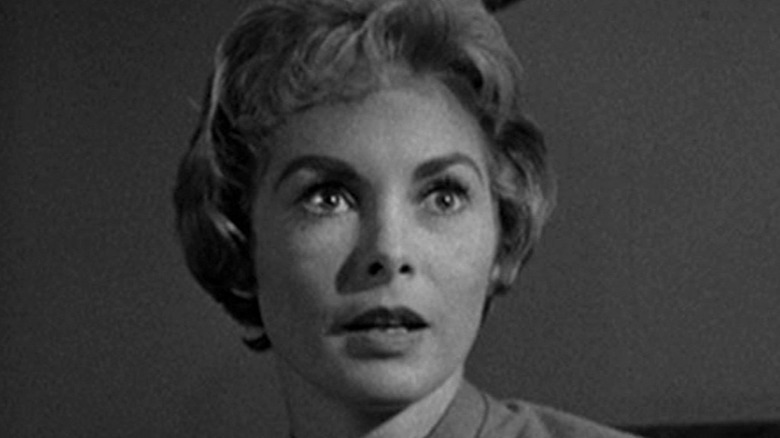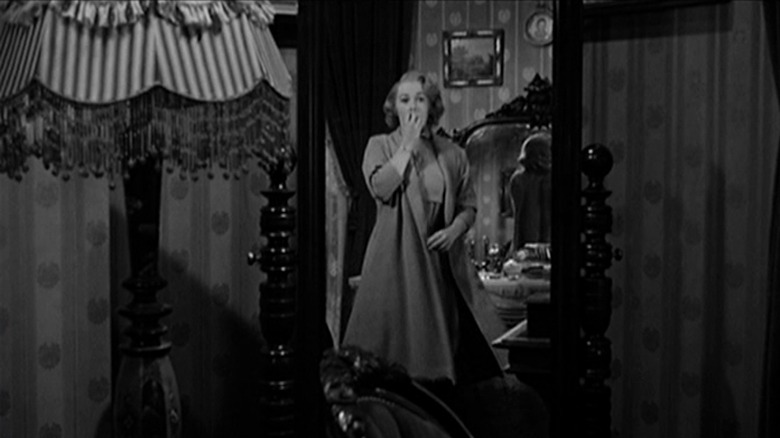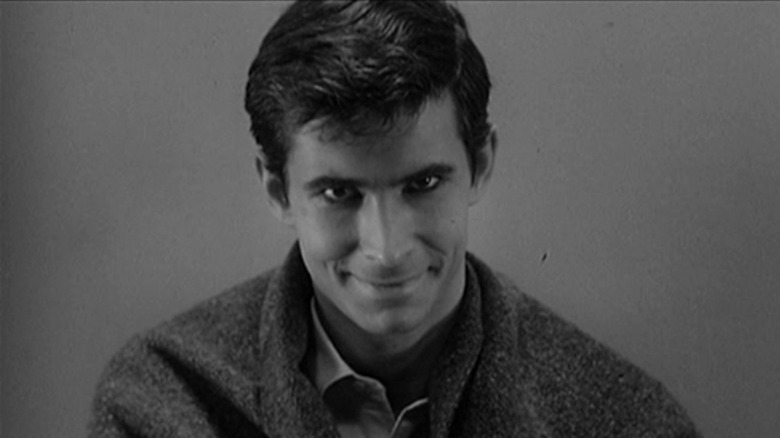This Classic Horror Movie Was Spoiled Months Before Its Release
Alfred Hitchcock's "Psycho" is one of the most iconic horror films in cinematic history. Its complex plot features overlapping crimes, toying with the good-versus-evil film trope, and its soundtrack by Bernard Herrmann is famous for its manipulation of listeners' emotions and perfect accompaniment to the plot's events. The investigation of Marion Crane's (Janet Leigh) theft of $40,000 ultimately leads to the discovery of her murder, revealing the unusual workings of the mind of Norman Bates (Anthony Perkins), who slips into an alternate personality — one that emulates his possessive mother — whenever he begins to have feelings for another woman.
But you probably already knew all that. "Psycho" was a huge hit when it was first released in 1960 and continues to influence film and television to this day. There are three official sequels to the film and countless references to its terrifying shower scene, wherein Marion is stabbed to death by a shadowy figure who turns out to be Norman-as-Norma. (This scene was so traumatic to film that it made Janet Leigh afraid to take showers for decades!) One of the more recent "Psycho"-influenced projects is the A&E series "Bates Motel," a prequel to the film that follows Norman's upbringing, starring Freddie Highmore as Norman and Vera Farmiga as Norma — and even featuring Rihanna in the role of Marion Crane.
While the plot of "Psycho" may be well-known today, at the time of its production Hitchcock did everything in his power to mystify it, both to generate hype for the film and to ensure that the twists of the story shocked and scared viewers. Many steps were taken to keep the film's story a secret, but things didn't really go according to plan in the end.
Hitchcock made every attempt to keep Psycho's plot a secret
During the production of "Psycho," Alfred Hitchcock kept things as quiet as could be so as to not ruin the many surprises of the story (including that Janet Leigh's character, Marion Crane, would be unexpectedly murdered in the first half of the movie). While the film was based on a 1959 book — also called "Psycho" — by Robert Bloch, Hitchcock bought most of the copies of it in an attempt to prevent the plot from being widely known (via Variety). He used his reputation as a producer-director of unparalleled talent to secure an $800,000 budget from Paramount for the film without even sharing a script with the company. He shot the film at the Universal Studios lot where his anthology series "Alfred Hitchcock Presents" was filmed in order to keep Paramount in the dark throughout the film's production. And the original trailer for "Psycho" features Hitchcock himself speaking directly to the camera as he takes viewers on a tour of the set, hinting at plot events but never really revealing much. For example, outside the motel's office, the director talks about Norman as a man with a damaged psyche: "This young man, you had to feel sorry for him. After all, being dominated by an almost maniacal woman was enough to drive anyone to the extreme of — uh, well let's go in." Most of the trailer follows this format.
It was not just during production of "Psycho" that Alfred Hitchcock sought to keep its contents quiet — he also orchestrated the film's release to make sure that the plot remained a secret for maximum audience thrill. The film's rollout lasted for months, premiering at two New York theatres on June 16, 1960, followed by showings at theatres in Boston, Chicago, and Philadelphia on June 22, before becoming gradually more widely shown across North America and Europe in September 1960 (via IMDb). According to Variety, Hitchcock told theatres that they could not allow anybody in after the film had started — an uncommon practice at the time — because it would distract them from the story. With all the bases covered, from production to release, it seemed like "Psycho" would remain a mystery until viewers actually went to see it themselves, but there was one thing Hitchcock couldn't control: the media.
An early review of Psycho said way too much
Up till the premiere of "Psycho," Alfred Hitchcock successfully maintained his carefully cultivated air of secrecy around the film. But after that fateful first showing at the DeMille Theatre in New York on June 16, 1960, things went downhill fast. Six days after the premiere, on June 22, 1960, Variety published an article simply entitled "'Psycho' Film Review" that, despite explicitly agreeing to keep the plot summary vague, revealed a good share of "Psycho"'s twists: "Hitchcock uses the old plea that nobody give out the ending — 'It's the only one we have.' This will be abided by here, but it must be said that the central force throughout the feature is a mother who is a homicidal maniac. This is unusual because she happens to be physically defunct, has been for some years. But she lives on in the person of her son."
The article doesn't stop there. It goes on to hint at the biggest reveals of the film: Marion Crane's theft of the $40,000, Norman Bates' murders of Marion and Private Investigator Arbogast, how the investigation of Marion's crime ultimately leads to the solving of her murder ... it's more or less all there. And, making things even worse, Variety's "'Psycho' Film Review" was published the same day as the second round of showings, meaning that nobody outside New York was able to see the film before its plot was spoiled!
In hindsight, it's clear that this blabbermouthed article did not affect the overall success of "Psycho." The film has earned $32 million to date, according to The Numbers, and, more importantly, continues to inspire filmmakers and viewers alike. If you haven't seen "Psycho," go watch it — it's been culturally relevant since its release 81 years ago, and it's going to stay relevant for at least another eight decades.


